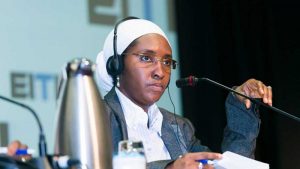
Director General Budget Office of the Federation has raised the alarm over Nigeria’s borrowing plan, saying the nation was fast exceeding its limited borrowing space.
Akabueze spoke Wednesday at the induction of newly elected lawmakers of the 10th National Assembly, at the International Conference Centre (ICC) Abuja.
His concerns and fear came at a time President Muhammadu Buhari forwarded a fresh loan request of $800 million to the National Assembly to service the needs of vulnerable 10.2million households at N5, 000 each.
The president said the loan, as part of the administration’s social intervention programme, would stimulate activities in the informal sector; improve nutrition, health, education and human capital development of beneficiary households.
Speaking at the induction of the lawmakers-elect, Mr. Akabueze said the country had one of the lowest Gross Domestic Product (GDP) to debt ratio in the world.
He said: “While the size of the FG budget for 2023 created some excitement, the aggregate budget of all governments in the country amounts to about 30 trillion naira. That is less than 15 percent in terms of ratio to GDP. Even on the African continent, the ratio of spending is about 20 percent. South Africa is about 30 percent, Morocco is about 40 percent and at 15 percent, that is too small for our needs.
“That is why there is a fierce competition for the limited resources that can determine how much we can relatively borrow. We now have very limited borrowing space, not because our debt to GDP is high, but because our revenue is too small to sustain the size of our debt. That explains our high debt service ratio.
“Once a country’s debt service ratio exceeds 30 percent, that country is in trouble and we are pushing towards 100 percent and that tells you how much trouble we are in. We have limited space to borrow.
“When you take how much you can generate in terms of revenue and what you can reasonably borrow, that establishes the size of the budget. The next thing would be to pay attention to government priority regarding what project gets what. The budget is not a shopping list. In the least, the budget only contains expenditure.”
Akabueze also criticized the nation’s budgeting system, saying Nigeria has no organic budget law.
“The Federal Government of Nigeria does not have an organic budget law. It is really unfortunate that we don’t have an organic budget law. Hopefully, there is one in the work in the 9th Assembly and may be passed before the Assembly winds up.
“I don’t know any serious country in the world that does not have an organic budget law. Each country has to determine its budget system that works for it. Budget is multi-dimensional in coverage. One, it is political because it allocates scarce resources of the country among multiple competing and sometimes, conflicting, interests.
“It is also an economic document because it helps as the primary fiscal instrument for stimulating economic growth, ensuring employment and maintaining economic stability. It is an accounting document and provides a ceiling and is legally binding for the government to operate. It is also a moral document. You can know what a country cherishes by looking at its budget document.”
Buhari’s request for fresh loan
Meanwhile, with just 19 days to end a two-term tenure of eight years of his administration, President Buhari has requested the Senate to approve a fresh $800 million loan from the World Bank.
The borrowing request for parliamentary approval for the fresh borrowing was contained in a letter he wrote to the Senate, and read at plenary Wednesday.
In the letter dated May 2, 2023 which was acknowledged as received on 10th May, 2023, the president said the credit facility was needed for the National Social Safety Net Programme (NASSP).
He said his government would expand shock response safety net support among the poor and vulnerable Nigerians and the government would make a cash transfer of five thousand naira (N5, 000) each to 10.2 million poor and low-income earners.
Already, the president said the Federal Executive Council (FEC) had already given him the go-ahead to borrow the money.
The letter as read by the Senate President, Ahmad Lawan reads: “It is with pleasure that I forward the above subject to you. Please note that the Federal Executive Council (FEC) approved an additional loan facility to the tune of USD800 million to be secured from the World Bank, for the National Social Safety Net Programme (NASSP) and the need to request for your consideration and approval to ensure early implementation (Copy of FEC Extract attached).
“The Senate may wish to note that the Programme is intended to expand coverage of shock responsive Safety Net support among the poor and vulnerable Nigerians. This will assist them in coping with the costs of meeting basic needs.
“You may wish to note that, the Federal Government of Nigeria under the conditional cash transfer window of the programme will transfer the sum of N5, 000 per month to 10.2 million poor and low-income households for a period of six months with a multiplier effect on about 60 million individuals. In order to guarantee the credibility of the process, digital transfers will be made directly to beneficiaries’ accounts and mobile wallets.
“The NASSP being a social intervention programme will stimulate activities in the informal sector; improve nutrition, health, education and human capital development of beneficiary households.
“Given the above, I wish to invite the Senate to kindly approve an additional loan facility to the tune of USD8OO million to be secured from the Word Bank for the National Social Safety Net Programme (NASSP).
“While hoping that these submissions will receive expeditious consideration by the Senate, please accept, Distinguished Senate President, the assurance of my highest regards.”
 DailyrecordNg …Nigeria's hottest news blog
DailyrecordNg …Nigeria's hottest news blog








